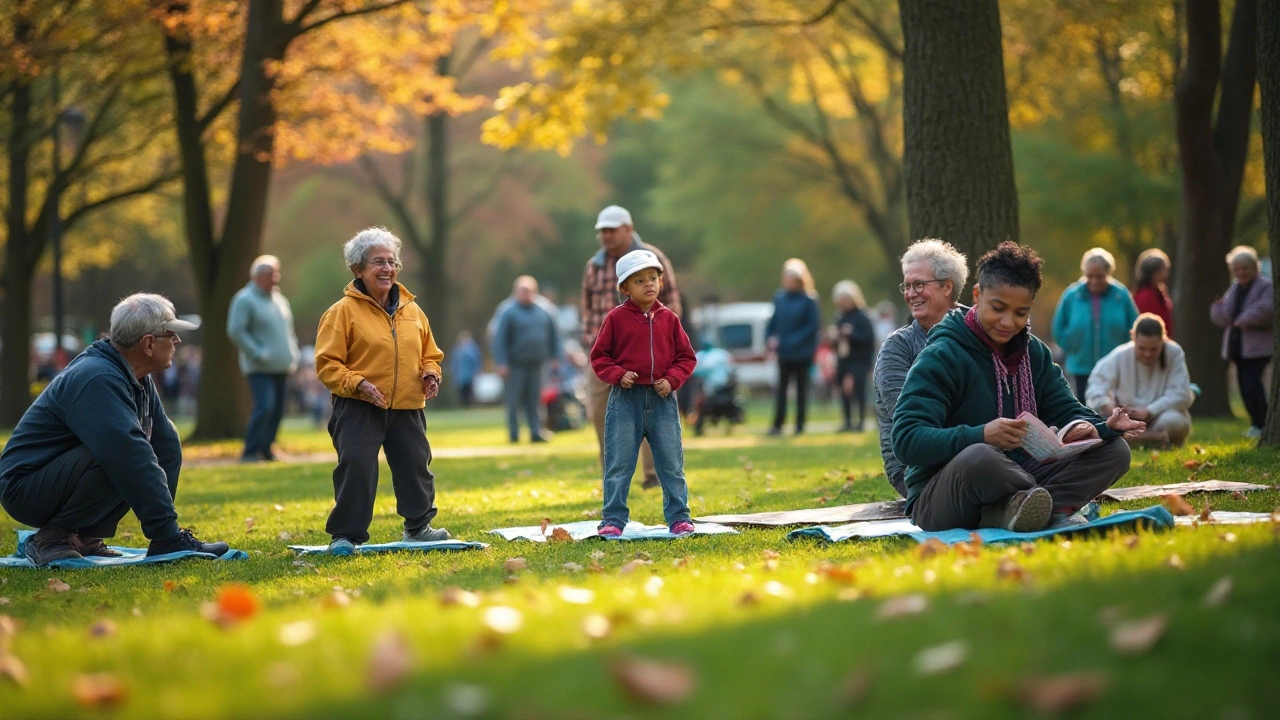Struggling with home repairs can be overwhelming for seniors living on a fixed income. This article breaks down the programs and resources in Massachusetts that help older adults keep their homes safe and comfortable. You'll get clear info on where to turn, what kinds of repairs are covered, and how to spot scams. Expect practical advice and a few tips on how to get through the paperwork. If you've wondered how to help your parents or neighbors, you'll find some real answers here.

- Created by: Lydia Carmichael
- Completed on: 8 May 2025
- Categories: Elderly Support
If you've ever tried to fix a leaky roof or deal with an ancient furnace, you know home repairs never come at a good time. For seniors in Massachusetts, even small repairs can become huge headaches, especially when money is tight or mobility is limited.
Here's something I wish everyone knew: Massachusetts actually offers several programs just for seniors who need help keeping their homes safe and livable. From free repairs to low-interest loans, there are real options out there—but most people miss out because they don't know where to look or what to ask for.
If you're worried about your own place, or you want to help your mom, dad, or elderly neighbor stay safe at home, this guide gives you the straight facts. No confusing jargon, no run-around. Just what works, and how to get started.
- Why Home Repairs Matter for Seniors
- Overview of Programs in Massachusetts
- How to Qualify and Apply
- What Repairs Are Covered?
- Tips to Avoid Scams
- Getting Extra Help: Where to Turn Next
Why Home Repairs Matter for Seniors
Broken steps, loose carpets, or a busted water heater might just seem annoying if you’re younger, but for seniors these problems can get serious. In Massachusetts, around 30% of older adults live in homes over 70 years old. That means there's a good chance something big will need fixing sooner rather than later.
Staying safe in your own place is a huge deal for older people. Falls are the leading cause of injury for seniors, and a lot of those falls start with things like uneven floors or bad lighting. When you don’t tackle repairs, a home can go from feeling cozy to becoming a minefield.
Plus, keeping up with repairs means less worry about things like mold, electrical fires, or heating problems in the winter. Water leaks or broken pipes don’t just mess with comfort—they can actually affect your health, especially for folks with breathing problems or arthritis.
| Common Home Hazards for Seniors | Potential Consequence |
|---|---|
| Loose rugs or floors | Falls and injuries |
| Broken stairs or railings | Restricted movement, higher fall risk |
| Old or broken heating | Cold-related health issues |
| Mold or water leaks | Breathing issues, property damage |
Fixing up these things boosts independence and helps seniors stay at home longer. Nobody likes the idea of moving before they’re ready, especially if it’s just because of a few fixable problems.
That’s what makes Massachusetts senior home repair programs such a game-changer. They help folks stay in their homes safely and comfortably without blowing the budget. It isn’t just about fixing stuff; it’s about giving people more good years right where they want to be.
Overview of Programs in Massachusetts
Massachusetts has a handful of solid options for seniors who need help fixing up their homes. The main players are local housing authorities, regional nonprofit groups, and a couple of state-run programs. Each one has its own rules, but they all aim to make homes safer and easier to live in. Here’s a closer look at what’s really available:
- Massachusetts Home Modification Loan Program (HMLP): This one is a big deal if you’re struggling with stairs, tubs, or narrow doorways. It’s not a grant, but it offers zero-interest and low-interest loans (the payback terms are super flexible) so seniors can make their homes safer — think ramps, walk-in showers, grab bars. They don’t check your credit, and you don’t need to own your home outright.
- Local Councils on Aging: These are goldmines for info. Many councils have funds or partnerships for minor repairs like fixing steps, leaky faucets, or dangerous railings. They’ll often help with filling out forms, too.
- Community Action Agencies & Nonprofits: Groups like Action, Inc., and Community Teamwork offer emergency repair help or refer folks to trusted contractors who volunteer their time. If you need something urgent, like a heat fix in January, these are the places to call.
- Federal Weatherization Assistance Program (WAP): This program runs statewide and helps eligible seniors lower their heating bills. They’ll check your house for insulation leaks, upgrade windows, and sometimes even fix old furnaces for free.
- Massachusetts Rehabilitation Commission (MRC): For folks living with a disability, the MRC helps line up home adaptations — for example, installing chair lifts or widening doorways. The application process takes some patience, but it can make all the difference.
Here’s a snapshot of repair and modification help that’s out there for Massachusetts seniors:
| Program Name | Type of Help | Who Qualifies? |
|---|---|---|
| Home Modification Loan Program | Loans for accessibility upgrades | Any homeowner with a disability, or an older adult needing safer access |
| Local Councils on Aging | Small repairs, form help | Residents over 60, sometimes income limits |
| Weatherization Program (WAP) | Energy fixes/insulation | Income-based, includes seniors on Social Security |
Every town does things a little differently, so it pays to start by calling your local Council on Aging or City Hall. Even if they don’t directly handle repairs, they’ll know who does. And don’t forget to ask about waitlists — some programs fill up fast, especially after a storm or tough winter.
How to Qualify and Apply
Here’s where it often gets tricky: figuring out who can get help, and how to start. Most senior home repair programs in Massachusetts have a few things in common. They focus on people 60 and up, but the exact age might change depending on the program. They usually have income limits, and you often need to own and actually live in the home that needs repairs.
Let’s break it down with the three most common programs:
- Home Modification Loan Program (HMLP): Targets both seniors and people with disabilities who need to change their home to make it safer—for example, adding ramps or widening doorways. Income limits are based on where you live. All you need is proof of age (like an ID), proof of income (tax returns or Social Security statements), and proof you own the home.
- Community Development Block Grant (CDBG): Some towns and cities use these federal funds to help low-income homeowners, including seniors. Check with your city hall or local housing department. If your community has funds, they’ll often post applications online or offer paper forms at the senior center.
- Local Councils on Aging (COA): These groups sometimes run their own small programs or know about local nonprofits who do. Even if the COA can’t help directly, they’re good at pointing you to the right office or phone number.
Here’s a quick cheat sheet for applying:
- Find out which program covers your type of repair and zip code. Your local COA or town hall is a great first phone call.
- Gather documents—usually ID, proof of income, and proof you live in the home. For joint owners (like couples), you’ll need their info too.
- Complete the application. If forms scare you, most places will help you fill them out—just ask.
- Wait for a home visit or inspection. Programs usually send someone to see the repairs needed. Don’t start work before approval or you could lose out.
- Get approval and review details. Some help is a grant (free money), some is a low-interest loan you pay back if you sell the house.
A fun fact: In 2023, over 2,000 Massachusetts seniors used these programs to fix things like heating, broken steps, and old plumbing. That’s real people getting real help.

What Repairs Are Covered?
If you’re Googling “Massachusetts senior home repair help,” you’re probably wondering what actually qualifies for these programs. The good news? The list is longer than you might expect—at least for the main statewide and local programs that have real funding.
Most programs put safety and basic living needs first. Here’s a breakdown of what usually gets covered:
- Heating system repairs or replacements (think broken boilers or old furnaces right before winter hits)
- Fixing roofs, leaking or damaged, to prevent water damage
- Electrical issues—blown circuits, broken outlets, or outdated wiring that could cause a fire
- Plumbing repairs, from leaky pipes to busted water heaters
- Installing accessible features, like grab bars, wheelchair ramps, or stair railings
- Weatherization upgrades, including insulation and window repair to help with energy bills
- Minor carpentry—fixing steps, railings, or doors that don’t close right
- Bathroom updates, if needed for mobility (like walk-in showers or taller toilets)
Programs usually don’t pay for cosmetic fixes. If the job’s just about making a place look nice (paint, new cabinets), don’t count on help. The work has to make the home safer or support “aging in place.”
For big jobs—like replacing a whole roof—the help may come as a grant, a deferred loan (you don’t pay unless you move), or a low-interest loan. Each town or program sets its own limits, and there’s usually a ceiling on how much you can get in a year. In Worcester, for example, the Senior Home Repair Program caps repairs at $5,000 per year, while Boston has its own guidelines.
Some programs keep track of the most common repair requests. Here’s a quick look at what’s actually getting fixed:
| Type of Repair | % of Requests (2024 data, MA Council on Aging report) |
|---|---|
| Heating/Hot Water | 34% |
| Roof/Structural | 22% |
| Accessibility Modifications | 18% |
| Electrical | 9% |
| Plumbing | 8% |
| Windows/Insulation | 6% |
| Other | 3% |
Bottom line: If it keeps you warm, dry, mobile, and safe, there’s a decent shot a Massachusetts senior home repair program covers it. Always ask, since each case gets looked at on its own.
Tips to Avoid Scams
Let’s be honest—scammers are busy, and they know older adults with home repair needs are prime targets. I’ve heard way too many stories about fake contractors, phony government reps, and people just looking to make a quick buck off seniors who only wanted a safe house. Here’s how to keep yourself (or your parents) out of their trap.
- Always check credentials. In Massachusetts, contractors who work on home repairs must be registered. Ask to see their registration or license number—then look it up on the state’s Office of Consumer Affairs licensing check website. Don’t accept just a business card.
- Never pay the full amount up front. Legitimate programs and contractors might need a deposit, but watch out if they want all the money before any work starts. Usually, 1/3 to 1/2 up front is standard in the state, and the rest after the work is finished.
- Avoid cash deals. Pay with checks or cards, so you have a record. If a contractor insists on cash only, that’s a huge red flag.
- Get it in writing. Always have a written contract explaining exactly what’s being done, the materials used, the timeline, and the total cost. If someone refuses to give you something in writing, walk away.
- Be wary of door-to-door offers. Scammers often show up right after storms, offering quick fixes at “discount” prices—then disappear. If someone comes to your door, don’t let them in, and call a family member or trusted neighbor if you’re not sure.
- Know your programs. If someone says they work for a government program or charity, call the agency yourself using a number from their real website (not a flyer or business card) to make sure the person is legitimate. Most senior home repair assistance programs will never show up unannounced or demand instant decisions.
- Watch out for deals that sound too good to be true. Massive discounts, “today only” offers, or pressure to sign right away are clear scam tactics. Take your time.
| Red Flag | What You Should Do |
|---|---|
| Contractor has no license | Check https://www.mass.gov; don’t hire them |
| Wants all money up front | Refuse; standard is a partial deposit only |
| Unsolicited home visit | Don’t open the door, call a trusted person |
| No paperwork given | Don’t proceed without a contract |
If you ever feel uneasy, call the Massachusetts Elder Abuse Hotline (1-800-922-2275) or your local Council on Aging. Sometimes, just double-checking can save thousands of dollars and a big headache.
Getting Extra Help: Where to Turn Next
Don't get overwhelmed if you hit a roadblock. Plenty of local organizations step in where official home repair programs or grants can't cover everything. The key is knowing the right places to call.
Start with your local Council on Aging. Every Massachusetts city and town has one, and they’re not just about social events—they help seniors access resources they didn’t even know existed. Staff can connect you with state-funded repair options, local volunteer groups, or even churches that pitch in for projects like wheelchair ramps or grab bars.
If you’re a veteran, check with the Massachusetts Department of Veterans’ Services. They have different funds just for veterans and sometimes cover things like roof repairs or home safety upgrades. There’s also the USDA Rural Development Program, which offers low-interest loans and grants for rural homeowners over 62. You don’t have to own a farm to qualify—plenty of small towns fit the bill.
For those in critical need, the Massachusetts Home Modification Loan Program is a game-changer. This state-run program gives low- or no-interest loans for senior home repair or upgrades to make your home safer. They don’t just hand you cash; the process helps you plan and get legit contractors. If paperwork makes your head spin, your local housing authority or Aging Services Access Point (ASAP) can walk you through it.
If you want quick info, here’s the short list of who to contact:
- Local Council on Aging: first stop for info and referrals
- Aging Services Access Points (ASAPs): regional agencies for hands-on help
- Massachusetts Home Modification Loan Program: for changes like railings, ramps, or bathroom fixes
- USDA Rural Development Program: grants and loans for rural seniors
- Veterans’ Services: special help if you served
Still unsure? Friendly voices at MassOptions (1-800-243-4636) can answer questions and find local programs. Hang in there—a little persistence goes a long way when it comes to getting help with home repairs.
Navigating the plethora of elderly assistance programs in Massachusetts can be daunting, but understanding the options can significantly impact the quality of life for seniors and their caregivers. This article explores various state-sponsored and private programs available in 2025, offering support in healthcare, housing, financial assistance, and community services. By diving into each program's specifics, readers can find the most suitable resources for their needs. Discover how these programs empower the elderly to lead independent and fulfilling lives.
